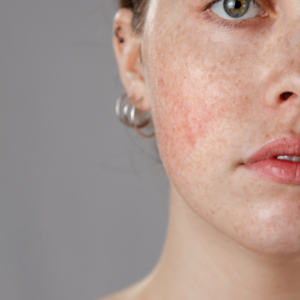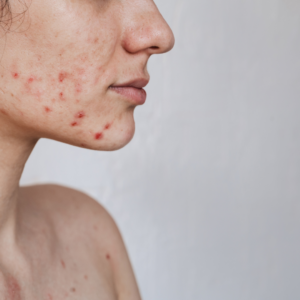
Rosacea Awareness Month: Signs, Symptoms & Treatment Options
Discover a youthful lift without surgery. Learn how our thread lift at Bryn Mawr Dermatology can rejuvenate your appearance.
Did you know that over 35 million Americans suffer from itchy skin? Itchy skin, also known as pruritus, can be a frustrating and uncomfortable condition that affects people of all ages. Itchy skin is a common issue affecting many people, but knowing the best course of action can be challenging. Many factors can contribute to itchy skin, and there are also many ways to treat it.
While this article spells out some important information about Itchy Skin, we highly recommend you read the full article, here are the key points we will focus on:

More often than not, itchy skin is accompanied by an irritant. This could be a tiny bug, a stray hair, or a rash. In these cases, once the irritant has been removed or resolved, the itching sensation will subside as well. But sometimes, you sense itching without seeing any visual signs of a skin disturbance. In both incidences, with or without an identifiable trigger, your specialized skin receptors have been activated. Your nerves relay this message to your brain which then interprets the sensation as an “itch,” and in response sends your fingers towards the sensation to scratch it. When there is a physical irritant, like that pesky mosquito that has alighted on your leg with bad intentions, your fingers will remove the cause of the itch. Problem solved.
So what causes an itching sensation when there is no obvious physical irritant? Sometimes we can chalk this up to misfiring receptors that are tripping the itch-scratch cycle. But in the case that this itching becomes chronic it can start affecting activities of daily living and start a wicked itch-scratch cycle. This is when your physical act of scratching actually causes the itching sensation. Round and round we go. If you find that your sleep is disrupted, your scratching is uncontrollable, or you are causing damage to your skin by scratching it, it is probably time to see a dermatologist.
Various factors – other than the easy to eliminate foreign body – including dry skin, eczema, psoriasis, and allergies, can all cause itching. Most of these can be remedied with lifestyle changes or prescription medications. However; some itchy skin can be a symptom of a more serious underlying condition, such as liver disease or kidney failure.
If you’re suffering from it, don’t wait—contact Bryn Mawr Dermatology today! We can help identify the root cause of your condition and determine the best treatment plan for your unique needs.
There are several different causes of itchy skin. Some of the most common include:
Speak to an expert dermatologist if your symptoms are prolonged or seem to be getting worse.
Itchy skin can be a problem for anyone, from babies to adults. In addition to the discomfort it causes, itchy skin can also lead to scratching—which can lead to even more itching and redness.
Luckily, there are tons of treatments for it at home and in the office.
At-home options: Use moisturizers like lotions and creams if your skin is dry. Avoid products with artificial scents and dyes and focus on the important ingredients like glycerin, urea, hyaluronic acid, and sodium PCA. Reducing the time and temperature of your showers is an easy way to help your skin retain moisture. You can also add a humidifier to rooms of your home you are frequently in. Finally, you can try over-the-counter allergy medications like Allegra or Zyrtec (generics work just as well) during the day and Benadryl at night.
Prescription options: Your doctor may prescribe a cream to apply to your skin or prescribe pills that you take orally. Caring for eczema, for instance, begins with diligent at-home routines supported by skin specialists and practiced by patients. Moisturization and avoiding known skin irritants ensure patients are comfortable and minimize flare-ups. Additional treatments that dermatologists may prescribe include:
If your symptoms don’t disappear with lifestyle changes and moisturization, you may need to take prescription medicine or try other treatments from Bryn Mawr Dermatology.
Bryn Mawr Dermatology can help diagnose and treat itchy skin. We offer a variety of prescription treatments in topical, oral and injectable formats that can help treat clinically itchy skin. We can also order testing to help identify the cause of a mystery itch. In combination with medical assistance and advice, we also offer clinical skin care products to effectively treat and prevent it. Specially formulated lotions, cleansers, shampoos and soaps that are designed to help you retain moisture and hydrate skin are available in our Villanova and Collegeville locations and also online in our store. Here are a couple of our favorites.
Glycolic acid is proven to exfoliate the skin, leaving it smoother and supple with regular use. This body wash is easy-to-use and leaves your skin feeling rejuvenated.
The Perfect Body Lotion contains 15% Glycolic Acid, which exfoliates and brightens skin. Master antioxidant Glutathione lightens pigmentation, and retinol increases cellular turnover for smoother, firmer, youthful skin.
For more information about skincare products, visit our online shop!
You can do a few things if you’re looking for ways to prevent itchy skin.
First, shoot for clean living. Eat foods high in vitamins A, C, and E. Vitamin C helps your body fight off bacteria, while vitamin A is good for skin health. A balanced diet is helpful to keep your immune system in working order and fend off any invaders that may cause itching. Ditch the tobacco products and alcohol – these cause deleterious effects to skin. Add in a few rounds of exercise vigorous enough to get your blood flowing. This will motivate your circulation to bring surplus oxygen to your skin and remove built up damage.
Next, try using moisturizers with natural ingredients like Shea butter or aloe vera gel instead of those with artificial scents. These will help keep your skin hydrated and prevent dryness that leads to flaky, dry patches on your face and limbs!
Finally, ensure you’re getting enough sleep each night because lack of sleep can lead to breakouts, blemishes, and other skin problems such as eczema and acne flare-ups!
Our doctors are also here to help if you ever need a second opinion on any part of your treatment plan—whether it’s a new medication or an adjustment to an existing treatment plan. We want our patients to feel confident in their decisions and comfortable with the care they receive from us at Bryn Mawr Dermatology.
If you have a question about skincare, please schedule a consultation. Our skilled dermatologists will evaluate your concerns during your consultation and determine an ideal treatment plan for your specific case. Our Bryn Mawr office is beautifully equipped, so you’ll feel at home as soon as you walk in the door. Get started today by calling our dermatology team at (610) 525-7800. We look forward to caring for you!

Discover a youthful lift without surgery. Learn how our thread lift at Bryn Mawr Dermatology can rejuvenate your appearance.

Discover a youthful lift without surgery. Learn how our thread lift at Bryn Mawr Dermatology can rejuvenate your appearance.

Discover a youthful lift without surgery. Learn how our thread lift at Bryn Mawr Dermatology can rejuvenate your appearance.

Struggling with acne scars? Discover the best dermatologist-approved treatments for smoother, clearer skin.

Looking to get your body summer-ready? Explore CoolTone and other expert treatments at Bryn Mawr Dermatology. Book your consultation today!

Looking to get your body summer-ready? Explore CoolTone and other expert treatments at Bryn Mawr Dermatology. Book your consultation today!

By: Bryn Mawr Dermatology, Published: Jan 31, 2023
Medically Reviewed By: Christine Stanko, MD, FAAD – June 25, 2024
For COSMETIC APPOINTMENTS:
For MEDICAL APPOINTMENTS: